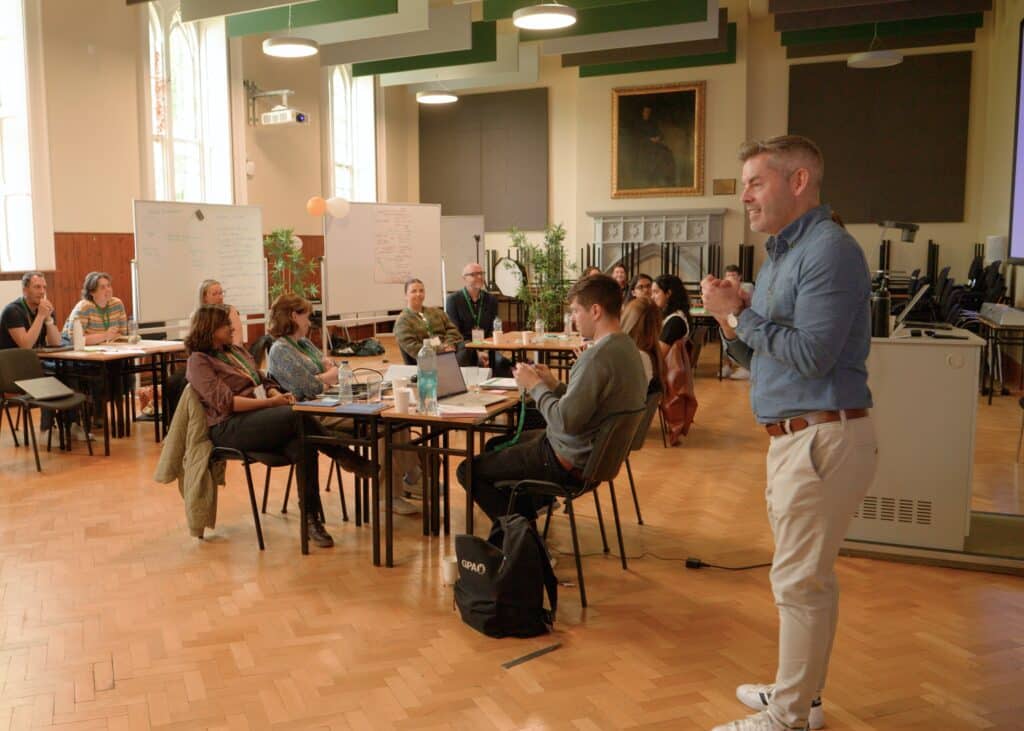DCU’s National Anti-Bullying Research and Resource Centre, in partnership with Facebook, calls on Teachers to Register for FUSE, the Anti-Bullying Training Programme for Post-Primary Schools. The National Anti-Bullying Centre (ABC) at Dublin City University is announcing the first set of dates for FUSE, a research based programme to train teachers in how to tackle bullying both online and offline. ABC is urging teachers in post-primary schools to register for one day of training on either September 24th, 25th or 26th.
The programme, supported by Facebook, is grounded in Irish and international best practice research, consisting of an in-person training session, online workshops and projects aimed at second year junior cycle students across Ireland. This is the second phase in the programme following an investment of €1m by Facebook.
The training will contain six modules, including bullying, cyber bullying, and online safety with a range of resources available to teachers to educate them on how to deal with the scenarios that are likely to occur within the classroom, the school and online.
This programme is designed to create champions within each post primary school in Ireland, who can then peer train other teachers, and parents, in how best to tackle a range of online and offline bullying issues. Over the course of the academic year, FUSE aims to increase reporting and reduce levels of bullying in schools. Collectively, this will enable school staff, students and parents, to tackle bullying and online safety together.
Professor James O’Higgins Norman, ABC Director and UNESCO Chair on Tackling Bullying in Schools and Cyberspace said, “We’re very excited to now move into the delivery phase of this initiative. Based on academic research and feedback from those on the ground, the course has been specifically designed to meet the needs of principals, teachers and parents, all while being youth led. By adopting a train-the-trainer approach, this programme will empower teachers and parents to further educate whole school communities in bullying, cyberbullying, and online safety issues. Education and understanding are key to tackling bullying in the school environment and this initiative will deliver both”.
Amy McArdle, Facebook’s Safety Policy Manager commented: “There is nothing more important to us than the safety of our users. That is why we have made a considerable investment in support of our safety partners, ABC. We always listen to the experts when it comes to online safety and are delighted to enable the ABC team tackle bullying in Ireland through the school environment. Over the three years of this initiative, we aim to help teachers and parents understand the complexities of bullying and develop the skills to support students when it comes to online safety.“
The FUSE programme is part of the Department of Education and Skills Wellbeing Framework and supported by the NABC, ISPCC and Dublin City University, and funded by Facebook. To run FUSE in your school and learn more about the programme please visit the FUSE website: https://antibullyingcentre.ie/fuse/ or please contact us on Tel: 01 884 2012.
To learn more about online safety and tackling bullying, please visit Facebook’s Safety Centre with a range of information and resources for parents, teachers and students: Facebook Safety Centre:
Facebook’s Safety Expert Tips on Tackling Bullying
If you handle it in the right way, online bullying can be confronted to help students to deal with it.
Prepare
- Take the student seriously.
- Find the best space to have the conversation.
- Try to stay calm and keep the conversation positive.
- Make sure you talk with the affected person as soon as possible after the incident.
Talk
- Be a good listener; try not to put words in the student mouth or jump to conclusions.
- Avoid using harsh or accusatory language, which can result in the student either shutting down or becoming more upset.
- Avoid being judgmental or critical about what behaviour they were engaged in before the bullying incident.
- Don’t blame your student for being the target of bullying.
- Reassure your student that you want to help find a successful resolution to the problem.
Act
- Based on what you learned from talking to your student, decide on next steps.
- If you and your student both agree that the situation isn’t that serious and doesn’t need to be escalated, still offer to help them.
- If the incident is serious enough to be reported, explain the school policies to your student and help them report the situation.
- If you think it’s appropriate for the bully and the student to talk, you can hold a conversation or a mediation session.
- If you think the student could be in danger, reach out to the authorities or principal immediately.
Follow Up
- Check in with your student to see how they’re doing. Ask if the situation has been resolved and if they feel comfortable at school.
- Make sure your students know what behaviours are acceptable in the classroom. Promote positive relationships and consider teaching conflict resolution skills.



